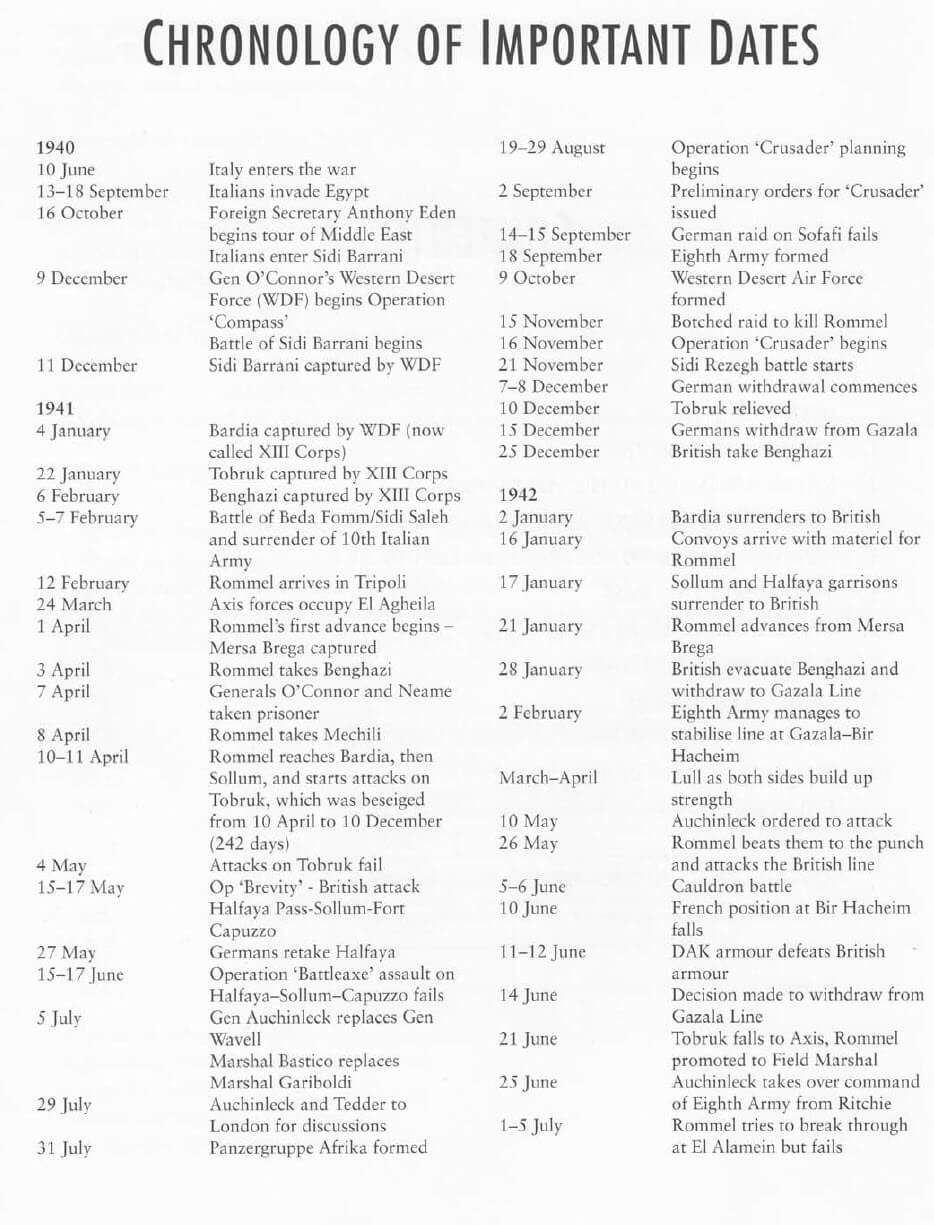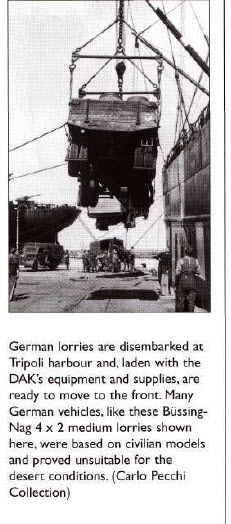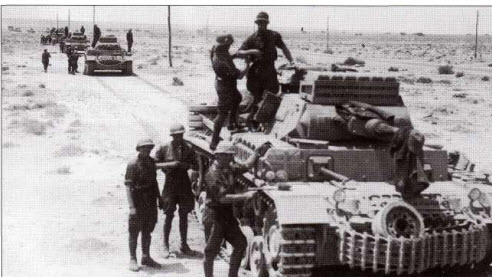
For those new to the war on the African Front here is a nice summary of important dates as they occurred:

The conundrum of the Afrika Corp and the African theater in general, was vast land distances, and supplies that can only come from one source and that is via shipping by sea, where both sides attempt to heavily interdict the shipping of the other.
We have these huge logistical issues which curtailed both sides operations.
These issues arise from control of sea lanes for both sides, and the enormous distances landed supplies and troops must travel once debarked proved to be one of the critical reasons that Axis forces could not succeed.

Another Influencing factor?
The impact of the massive break down in security on both sides had a significant impact as well and to some extent I think this may have proved to be the primary factor or at least a significant one as to why at least Rommel failed and possibly why Monty eventually succeeded.
But first lets look at the Logistics of Africa.
Major Paul Schreiber USMC wrote a paper about Rommel and his logistical issues and it is good summary reading as it ties logistics back to Operational Art of War.
The conclusions of this paper are to a degree for anyone who has played supply based Afrika theater games straight forward he suggested that you must:
1. Establish control of Sea Lanes.
2. Mission Analysis, what indeed is your mission!
3. Secondary theatre is defacto an economy of force operation.
4. Operational commander is in charge of AND the user of Logistics.
5. No room for ego.
Lets look at each factor.

Point 1 Control of Sea Lanes. The decision by Rommel and Nazi command to not secure Malta, and their Sea bound communications and transport meant that inconsistency in supply would not allow detailed planning and projection of capabilities. What would have happened if Operation Herkules was run and Malta taken? Could this have allowed the Axis to choke off Commonwealth supply to such an extent that Afrika would fall to the Axis? Would it have ensure that the volume of supplies was higher and landed more closely [Tobruk] thus shortening the logistical tale by over 1,000 km’s?
Logistical Losses by the Axis in 17 months:
Losses ranged from zero in some months to 62% of tonnage! From June 1941 through October 1942 the Axis lost 20.9% of all tonnes shipped monthly on average. 14,600 tonnes a month. Captured supplies generated a months supply. the capture of Tobruk and Benghazi shortened supply lines but even then 80% of all supply was coming from Tripoli to El Alamein [1786 km’s or 2021 kms if you take the then all weather coastal road].

Just as Alexander the Great struggled to move men, food and water by foot for 30000 to 100000 men in his Persian campaign, Rommel hit the inflection point where it took more fuel to move the goods than he could carry and still deliver enough resources to the front.

How important was the ability to transport safely? – From: War History.com
“The logistics problems facing the Germans in North Africa were to be extremely challenging. The primary Italian ports for shipping and embarkation to Libya were Naples, Bari, Brindisi, and Taranto. The main port in Libya was Tripoli, capable of handling five cargo ships or four troop transports at a time, or approximately 45,000 tons of cargo a month across its docks.
Although the Italians tried to improve their Libyan ports, they did so only after wasting considerable effort on repairing harbors in Albania. The small capacity of the ports also limited the size of convoys. Instead of running a relatively few large convoys, which would have been more efficient in terms of convoy defense, the Italians had to send many small ones, wasting fuel and escorts.

The Italians initially used massive escorts, including cruisers, but they were eventually forced to curtail this due to fuel shortages. Initial convoys averaged just four merchant ships with nearly as many destroyers or torpedo boats acting as escorts and at least one aircraft patrolling ahead of a convoy during daylight. Later, air cover for the convoys was greatly increased as the Italian air force made a major commitment. In time the Italian convoys were reduced in size, averaging just two ships, and becoming smaller in size as the British gradually eliminated the larger ones.”
So what would Rommel have done with an extra 15,000 tonnes of supplies a month? Would this have extended the war in Africa an additional year and a half? Could Rommel had more quickly leveraged his intel and forces to drive to Alexandria?
Point 2. The Mission. What was Rommel’s mission?
From my reading he ignored his orders, and went for broke. Was he imitating his exploits from France in 1940? Was he seizing the moment and taking advantage of an opportunity that would never be presented again? Was he out of depth, managing at a scale he had little experience with? There is certainly a body of content from other senior officers and officials that suggest that at the very least the ‘soft underbelly’ strategy for the AXIS, could pay dividends. By cutting off transport via the Suez, and blockading the Med the Axis could secure a southern approach to Russia via Turkey
[ who would either join forces or acquiesce]. Oil ever present on Hitlers mind was also available in this region, as well as providing a backdoor entry to the Causcasus’s. I’m still looking for a game title that will allow us to model that aspect of WW2 effectively.
Suffice to say though Rommel exceeded his mandate and took control of the Theater his way. But in doing so usurped the chain of command, broke the unity of command mandate and ultimately caused the failure of the campaign in Afrika. I suspect he was promoted either too quickly or beyond his capabilities. While personally brave and a great tactician his understanding of operational matters failed him as he failed to tie, the operational vision to his logistical constraints.
Point 3. Secondary Theater & Economy of Force.
This is a bit out of my league…LOL. Like many things I write about. However if indeed Afrika was relegated to a secondary effort subsumed to an Eastern Front push, Rommel’s efforts here really placed OKH/OKW in a difficult position. It seems to me that the Axis effort was over weight in troops for the very unclear goals. Then with the level of force there they were under supported by not securing supply lines, taking Malta/Gibraltar and dominating the sky. The British established control of Malta and reinforced it with Operation Pedastal in August 1942 Overall the Allies lost 76 warships the Italians 83 and the Germans 17. Germany also lost over 60 submarines.
This paper does focus on logistics but I wonder how important the change in Rommel’s access to intelligence from the US Military Attache Bonner Fellers through June 1942 was? Did this intel make him more aggressive, more successful, more determined to try and capture Alexandria despite his orders to the contrary?
I think the Logistical challenges and Rommel’s access to intel go hand in hand. Some of his maneuvers show more than tactical genius, but rather a clear inside track. If he knew where and when an enemy would attack or retreat or be gathering, he could ignore to a certain extent his fuel and ammo consumption, because he could always be there first with the most. Rommel derived amazing utility from a sparsely supplied force. Which leads us to point 5.
In regards to point 4 &5. Was Rommel’s ego, and disdain for detailed planning at an operational level caused by his over confidence due to his access to British plans and dispositions? The impact of ‘know what the enemy will do or can do’ at any time could have been an over riding factor?
He blithely dismissed Logistics to Higher Command and seemed to continue running things as a Divisional Commander versus a theater commander. In fact Kesselring dismissed the idea of invading Malta as the war was going so well in North Africa that they could afford to not do the costly seaborne invasion. It was seen to be more economical and effective to siege by air.
Rommel had of course this significant advantage of 20/20 vision of the battle field during the security breach, and this played into his successes at Gazala and Tobruk. Feller was transfered on July 7th 1942, and stopped using the same cipher in late June. By July 5th Rommel was defeated in his breakthrough attempt at El Alamein!
Contrarian views suggest that Fellers often inaccurate assessments of the British [ he was an avowed Anglophobe] caused over confidence in Rommel’s decision making.
” ‘Good Source’ bolstered Rommel’s decision to drive all-out on Alexandria, his native over-optimism reinforced by Bonner Fellers’ belief that the British would crack under one last blow. Both men were wrong; this time the intelligence failure led to German defeat.”_ Wiki & the End of the Beginning.
I find the Allied use and access to the Ultra messaging to have been less effective for them in Africa and the Med, than the Feller files. Even forewarned inept leadership in Crete saw it fall. Perhaps the Allies were more circumspect with its usage?

Why the long article? Well over the course of the next 12 months, I hope to progress our Vassal based session of DAK2 as well as some other titles set in Afrika. My opponent is playing Rommel. We are doing the Race to the Wire campaign. Once we have 3-4 months of game play done I will start posting our play. This article is means for me to divine his strategy, what happened, and where I maybe able to drive a different result.
